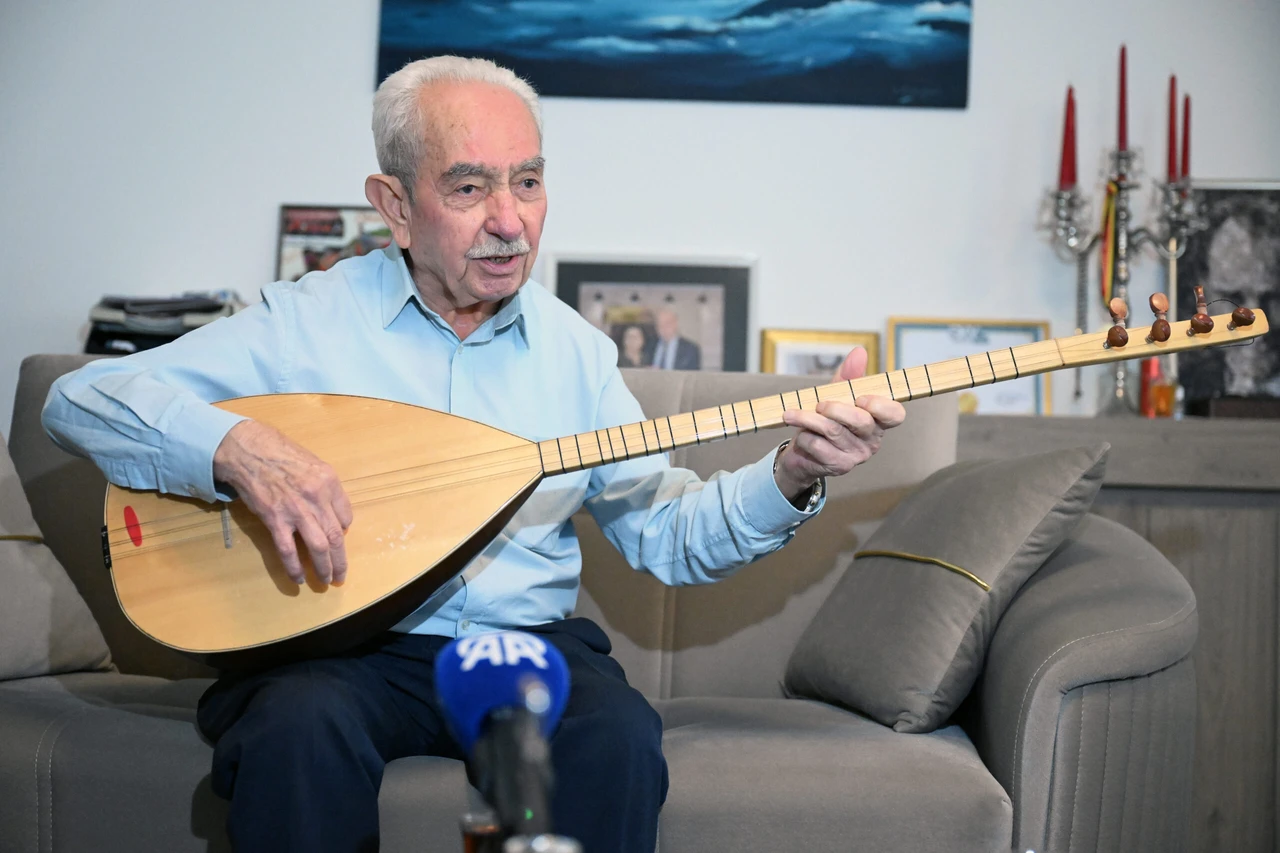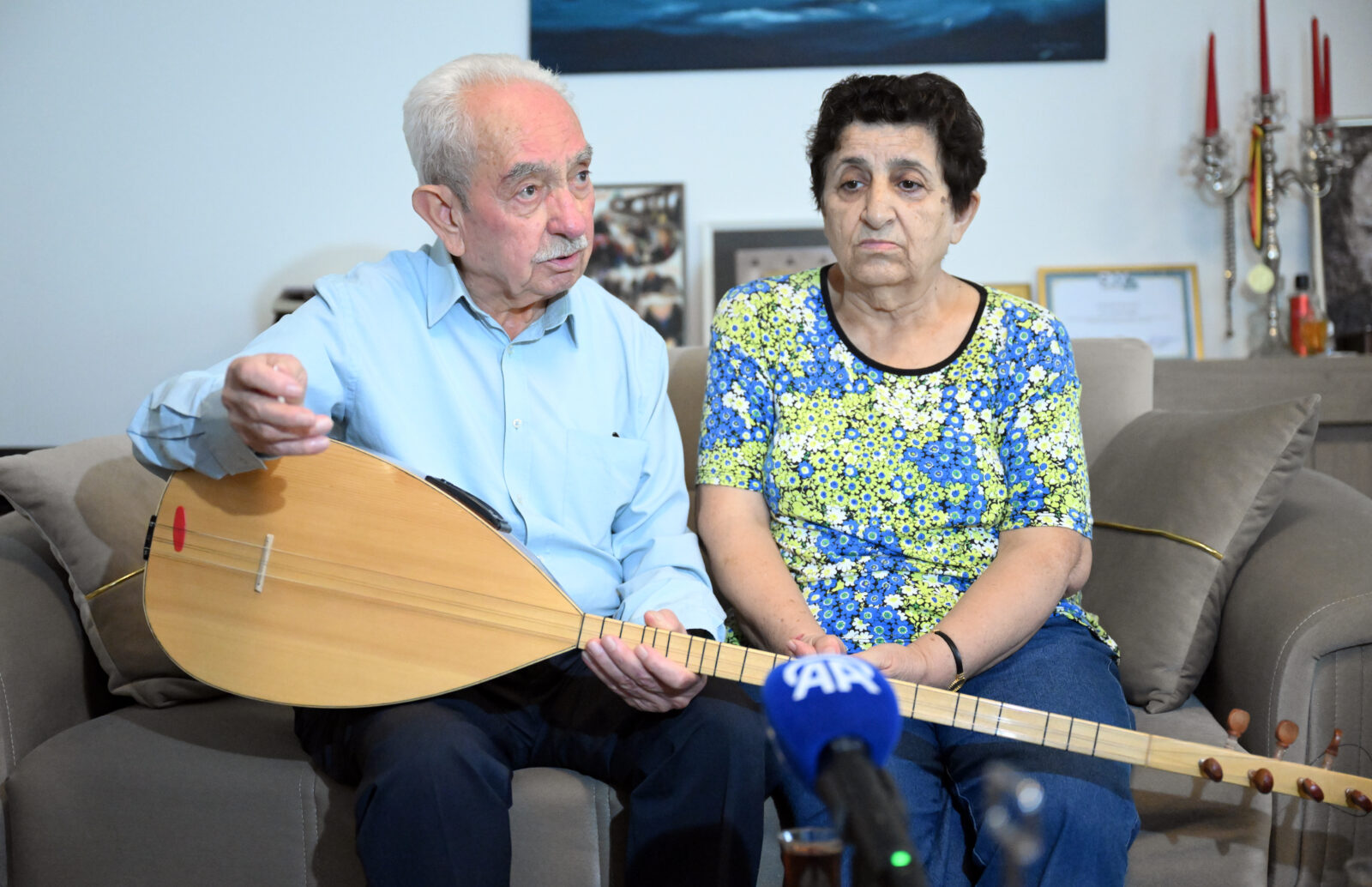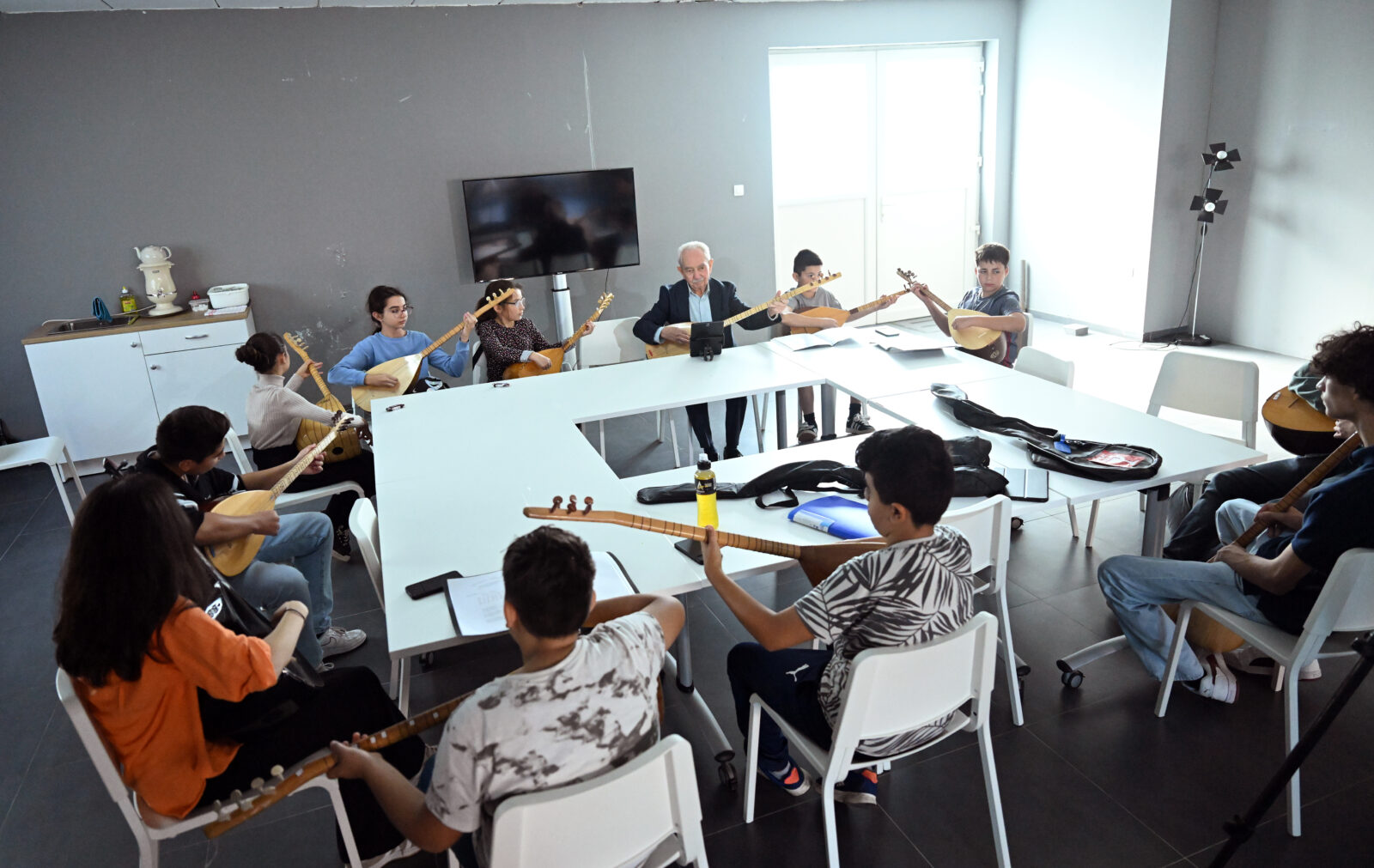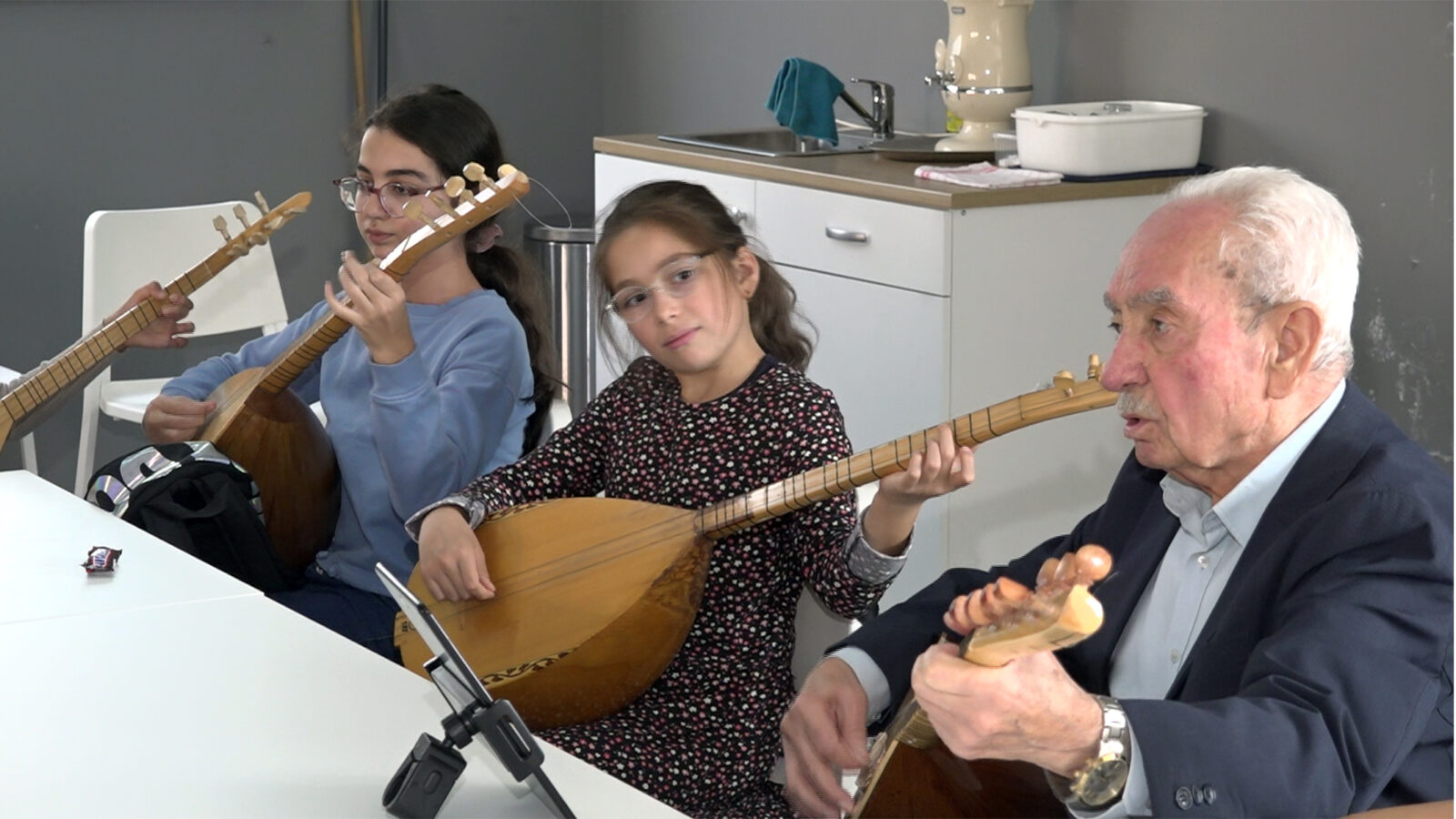Cultural bridge: Journey of 1st Turkish musician to arrive in Belgium
 One of the prominent figures in the Belgian Turkish community, master of the saz Ismail Erdogdu, represents the first generation of immigrants with his bittersweet memories, building a cultural bridge between the two countries for 60 years, September 30, 2024 (AA Photo)
One of the prominent figures in the Belgian Turkish community, master of the saz Ismail Erdogdu, represents the first generation of immigrants with his bittersweet memories, building a cultural bridge between the two countries for 60 years, September 30, 2024 (AA Photo)
Ismail Erdogdu, a master of the saz, is a cultural bridge between Türkiye and Belgium. As a first-generation Turkish migrant, he has been sharing the rich musical heritage of his homeland with Belgian audiences for over six decades.
In the inaugural episode of the series “Turks in Belgium from Generation to Generation,” an Anadolu Agency reporter spoke with Erdogdu, who is widely recognized as the “first Turk to bring the saz to Belgium.
Journey of memories: First steps in Belgium
Erdogdu, who migrated to Belgium through the Labor Agreement signed between Türkiye and Belgium in 1964, has spent the last 25 years as a saz teacher, continuing his journey that began in a coal mine.
Erdogdu is a prominent figure in the Turkish community in Belgium, serving as a cultural bridge between the two countries while sharing the bittersweet stories of migration through his folk songs from generation to generation.
“I will never forget the day I came to Belgium on Aug. 16, 1964,” Erdogdu recalls, explaining that his uncle brought him to continue his education.

Arriving with saz and suitcase
Erdogdu shared his story, saying that his interest in the saz caused him to struggle in middle school in Eskisehir. At the age of 17, he embarked on a journey of migration with his saz by his side.
“With a saz in one hand and a suitcase in the other, I arrived. Ahmet had brought me back after my visit. We traveled by train and bus. As we got off the bus, Ahmet asked for directions to my uncle’s house. Just then, someone called out, ‘Ismail!’ It was a family friend of my uncle. They had mentioned that I played the saz, so Meral recognized me when she saw it.”
Due to a language barrier, Erdogdu could not continue his education and, like many other Turks, began working in the coal mine, where he continued to play and sing folk songs.
Voice of experience
“There was no family reunification back then. Men stayed in lodgings. They would call out, ‘Ismail! Come play us a couple of folk songs,'” Erdogdu recalled.
His famous piece titled “Charbonnage,” which means coal mine in French, emerged during one of these moments. The lyrics tell the story of migration: “I came from Türkiye to Belgium. They call the mine I work in Charbonnage. I don’t know how many meters I went down. Charbonnage, Charbonnage, you cannot find workers like us. You cannot find workers like Turks.”

Facing harsh realities of migrant life
Erdogdu recounted the difficulties of working life, mentioning health issues such as lung diseases and various injuries resulting from the dusty environment.
“There was a doctor who told me, ‘There is dust in your lungs; go to Brussels.’ It was like a work accident, but we didn’t pursue it. We continued to do the hard jobs,” he explained.
Reflecting on his Belgian colleagues, he noted, “I remember them as generally good people. There was one Belgian co-worker who, when he got angry, would call me ‘Ey Turk!’ instead of Ismail. I understood he was upset, and I would remain silent, trying to adapt.”
Tragic news from home
Erdogdu shared a poignant memory of communication during that time, recalling the uncertainty of letter delivery. Sometimes, letters would reach their intended recipients, while others would disappear.
“Sometimes they found the address, sometimes they didn’t. One day, I came home to find my uncle sitting there, crying. When I asked what was wrong, he told me my grandmother had died. Before going to work, I stopped for a Turkish coffee, and everyone was offering their condolences. When the cafe owner asked what had happened, I mentioned my grandmother’s death. A friend then said, ‘Ismail, I thought your father had passed away.’ I was in shock. Later, my uncle handed me a letter – they had written it a few days after my father died. I learned about his death 40 days later.”
Erdogdu has been married to his wife Hatice for 52 years. Expressing his commitment, he said, “I can’t let go of my saz or my wife’s hand.”
When Erdogdu joked, “If there’s no food at home, it must be our wedding anniversary,” his wife laughed and replied, “He always forgets.”
Legacy of music and culture
After working for six years in the coal mine and 25 years in an automobile factory, Erdogdu retired and established a music club.
“Those who wanted to learn to play the saz came to me. They would call me ‘Hoca’ (teacher),” he said.
In 2017, he was named “exemplary senior citizen.” When he expressed surprise to the Turkish Ambassador Mehmet Hakan Olcay, the ambassador responded, “If I am an ambassador, you are a cultural ambassador.” This realization made Erdogdu appreciate the importance of his work even more, and he became known in some circles as “our cultural ambassador.”

Teaching next generation
Erdogdu has been teaching saz lessons for 25 years in his music club, welcoming students from ages seven to 70. He shared an anecdote about a grandfather who brought his grandson, who was reluctant to learn.
“We waited, but in the end, the child didn’t want to come. He said he wanted to play the guitar. The grandfather started coming. He was over 70 years old and learned two folk songs. He was playing ‘Ne aglarsin benim zulfu siyahim’ (Why do you cry, my dark-haired one).”
Erdogdu not only teaches saz but also offers informal Turkish language lessons, using the lyrics of folk songs to engage children who study in Flemish. Through his music club in Beringen, he continues to share his passion with children, adults, and women alike



